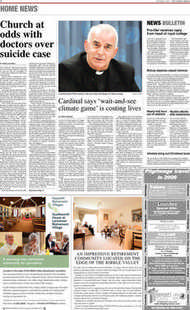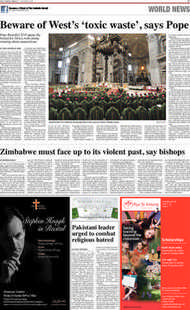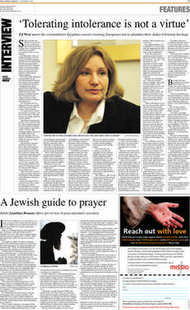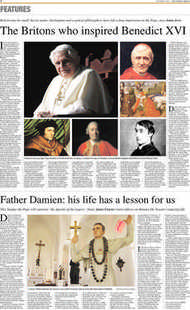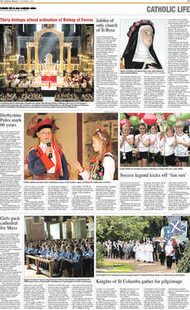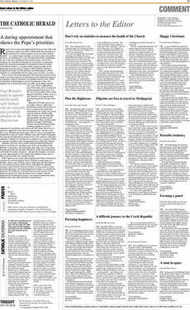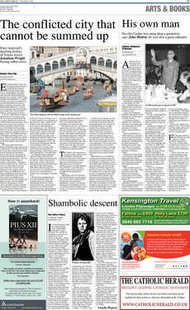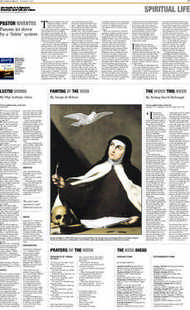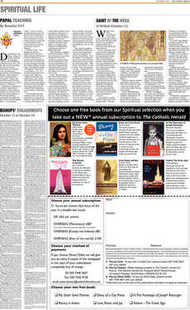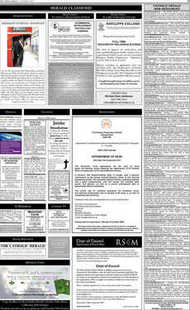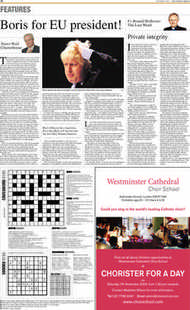Page 5, 9th October 2009
Page 5
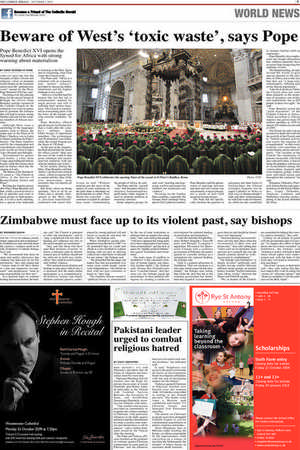
Report an error
Noticed an error on this page?If you've noticed an error in this article please click here to report it.
Tags
Share
Related articles
‘plague Of Abortion’ Ravages Romania
Pope Warns Africa Of ‘tyranny Of Materialism’
Vatican Unveils Details Of Pope’s Gruelling Three-day...
God Is Vital To Rounded Education, Says Pope
Canadian Leader Holds Frank Talks With Holy Father
Beware of West’s ‘toxic waste’, says Pope
Pope Benedict XVI opens the Synod for Africa with strong warning about materialism
BY CINDY WOODEN IN ROME
AFRICANS must tap into the strengths of their cultural and religious values to promote reconciliation on the continent and to resist the “spiritual toxic waste” spread by the West, Pope Benedict XVI has said.
Presiding over the opening Mass for the special Synod of Bishops for Africa, Pope Benedict said the vocation of the Catholic Church on the continent is to work for peace and to promote the holiness that will lead to justice, strong families and care for the weakest members of African societies.
Although there were a sprinkling of the languages spoken most in Africa, the major part of the Mass in St Peter’s Basilica was in Latin or Italian, including the Pope’s homily. The Mass booklets used by the congregation and concelebrants were illustrated with sacred art from Congo, Togo, Burundi and Ethiopia.
Accompanied by guitars and drums, a choir from Congo sang traditional African hymns while the Sistine choir and an Italian choir led the singing in Latin.
The theme of the October 425 synod is “The Church in Africa at the Service of Reconciliation, Justice and Peace”.
Reciting the Angelus prayer after Mass, Pope Benedict said that, while a synod involves a lot of speeches and work in small groups to draft proposals, it is not a study meeting, but a special time dedicated to listening to the Holy Spirit and to discerning what God wants the Church to do.
The Pope said: “Africa is a continent with an extraordinary human richness” provided by almost one billion inhabitants and the highest birthrate in the world.
“Africa is a fruitful land for human life, but this life is unfortunately marked by much poverty and still is suffering from serious injustices. The Church is committed to overcoming them with the force of the Gospel and with concrete solidarity,” he said.
Pope Benedict offered special prayers for Guinea less than a week after the country’s military junta killed dozens of opposition members. The government said 56 protesters were killed, while the United Nations put the figure at 150 dead.
At the end of the Angelus, the Pope prayed that the synod for Africa would “help turn the eyes of the world to that great continent and inspire renewed solidarity with our African brothers and sisters”.
In his homily during the Mass, Pope Benedict said that Africa’s spiritual and cultural values, which recognise God as creator and the value of life over possessions, were resources that can benefit all humanity.
But those values are being attacked, “first of all by an illness that is already widespread in the West, that is, practical materialism” combined with moral rela tivism, he said. “Without entering into the merit of the origins of such sicknesses of the spirit, there is absolutely no doubt that the so-called ‘First’ World has exported ... and continues to export its spiritual toxic waste,” contaminating the people of Africa, he said.
The Pope said the “second virus” that threatens Africa is religious fundamentalism, particularly when religion is used to promote political or economic interests.
Some religious groups, he said, were “teaching and practicing, not love and respect for freedom, but intolerance and violence”.
Focusing on the Sunday Mass readings, especially the Gospel about marriage being part of God’s plan for creation, Pope Benedict said the permanence of marriage between one man and one woman was not primarily a moral precept, but a result of how God designed human beings.
The Pope did not specifically mention the practice of polygamy and other forms of relationships the Church considers irregular, but he urged Catholics in Africa to find ways to deepen people’s faith and their understanding of what God wants for humanity, which, he said, would lead to stronger families built on matrimony.
Pope Benedict also emphasised the Gospel affirmation that children generally have an easier time recognising the authority of God.
The Gospel reading, he said, invited the Synod to give special attention to the children of Africa and to the fact that they are “a large and, unfortunately, suffering part of the African population”.
“Like the Lord Jesus Christ, the Church does not view them primarily as the recipients of assistance, nor of pity and exploitation, but as full people in their own right,” he said.
Pope Benedict noted the “great dynamism” of the Catholic Church in Africa, which according to Vatican statistics has grown from 55 million members in 1978 to almost 165 million by the end of 2007.
The Synod, he said, was an occasion to thank the Lord for the growth of the Church and to “rethink pastoral activity and renew the impulse of evangelisation” so that every Catholic will contribute to reconciliation, justice and solidarity. “The vocation of the Church, the community of persons reconciled with God and with each other, is that of being the prophecy and leaven of reconciliation among the various ethnic, linguistic and even religious groups within each individual nation and throughout the continent,” he said.
Ethiopian Orthodox Patriarch Abuna Paulos and representatives of the Greek Orthodox, Coptic Orthodox, Anglican, Lutheran and Methodist churches participating in the Synod attended the Mass.
blog comments powered by Disqus



